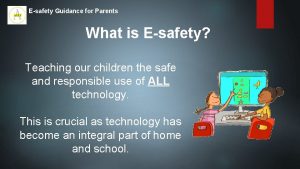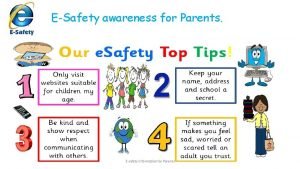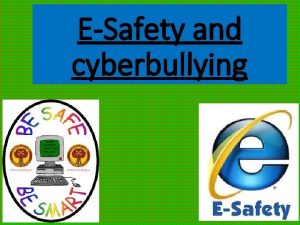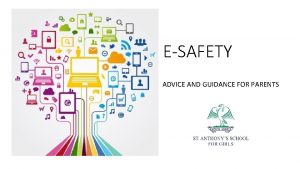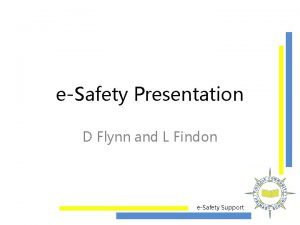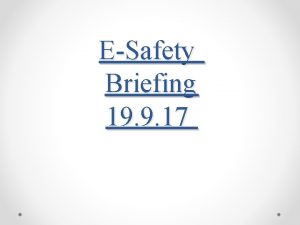Esafety Guidance for Parents What is Esafety Teaching








- Slides: 8

E-safety Guidance for Parents What is E-safety? Teaching our children the safe and responsible use of ALL technology. This is crucial as technology has become an integral part of home and school.

E-safety Guidance for Parents What are the risks? • • Inappropriate content Contact by strangers Cyberbullying Scams and downloads which steal information

E-safety Guidance for Parents Did you know? Snapchat Facebook Instagram Twitter Musically These apps/websites require users to be at least 13 years old.

E-safety Guidance for Parents

E-safety Guidance for Parents Cyberbullying Cyber bullying is the name that is used when people use the internet to send nasty and upsetting messages to others. It can also be done by people using mobile phones, by sending messages and making nasty phone calls. Did you know? There is not a specific law which makes cyberbullying illegal but it can be considered a criminal offence under several different acts including Protection from Harassment Act (1997) and the Malicious Communications Act (1988)

E-safety Guidance for Parents The SMART rules S M A R T Safe: Never give out personal information (such as full name and address) to people you do not trust online. Meeting: Meeting up with someone you have only been in touch with online can be dangerous. Accepting: Opening emails, messages and texts from people you do not know can be dangerous. Reliable: People online can sometimes lie about who they are and information found online may not always be true. Tell: Tell parents/carers or teachers if someone or something online ever makes you feel upset or uncomfortable.

E-safety Guidance for Parents How to encourage e-safety Practical principles: Talk with your children. Agree family guidelines and rules. Discuss regularly online safety. Infrastructure: Virus and firewall protection software up-to-date. Browser safety feature enabled. Education: Learn together about new technologies and enjoy! Reflect together about new technology – pros and cons. Systems: Monitor time spent on the internet. Use filtering software. It has been said that children will not tell you about a problem if they feel that their access to the technologies will be restruicted.

E-safety Guidance for Parents Useful websites www. thinkuknow. co. uk www. kidsmart. co. uk www. saferinternet. org www. childnet. com www. safetynetkids. org. uk
